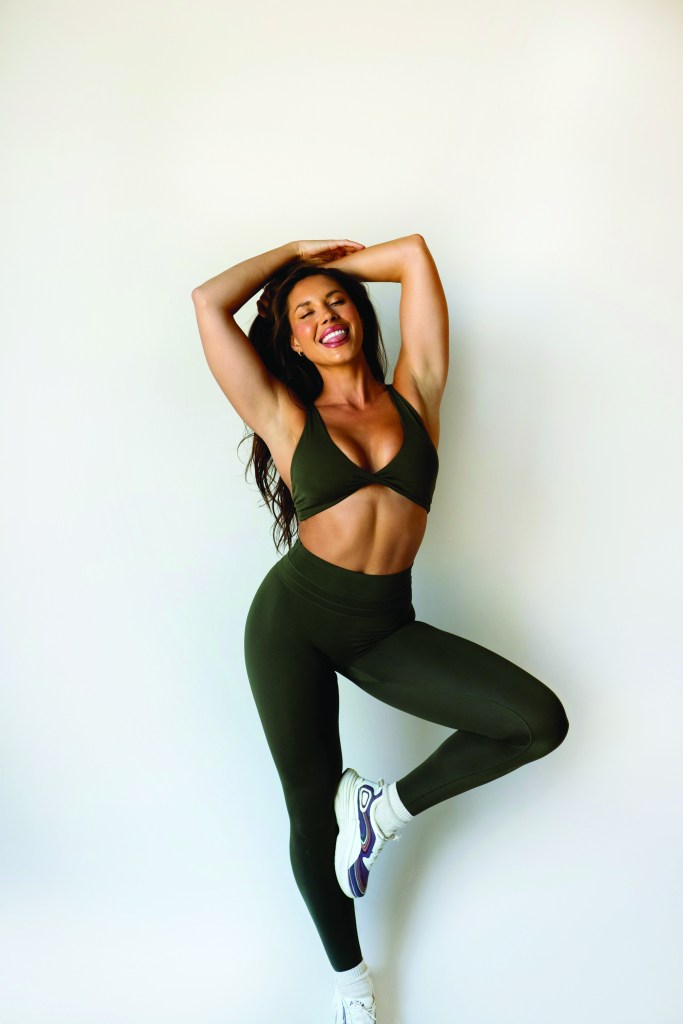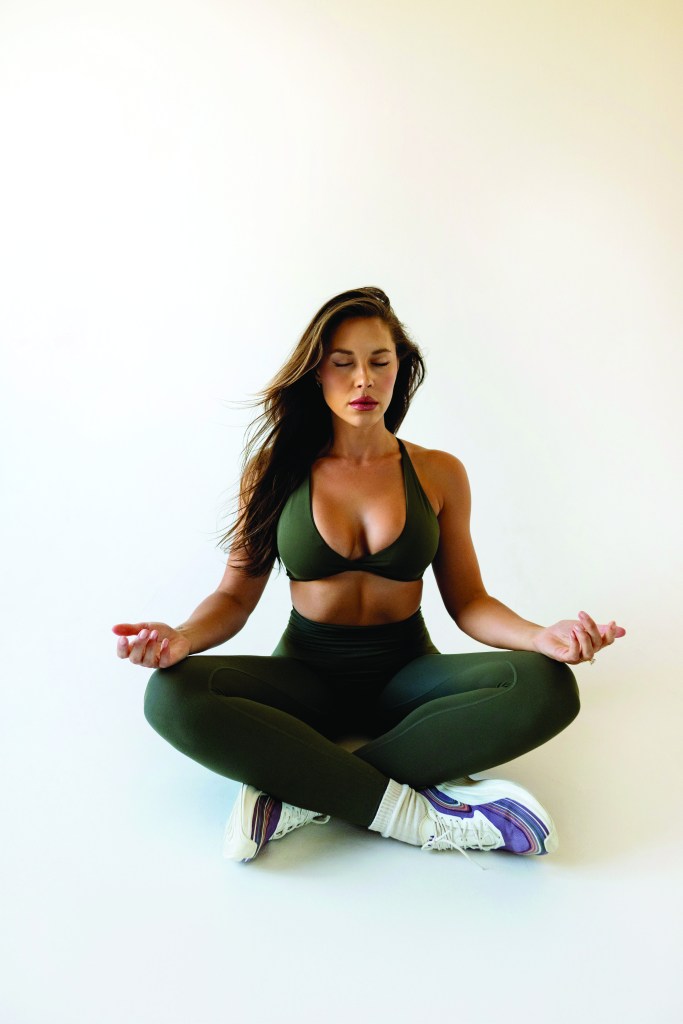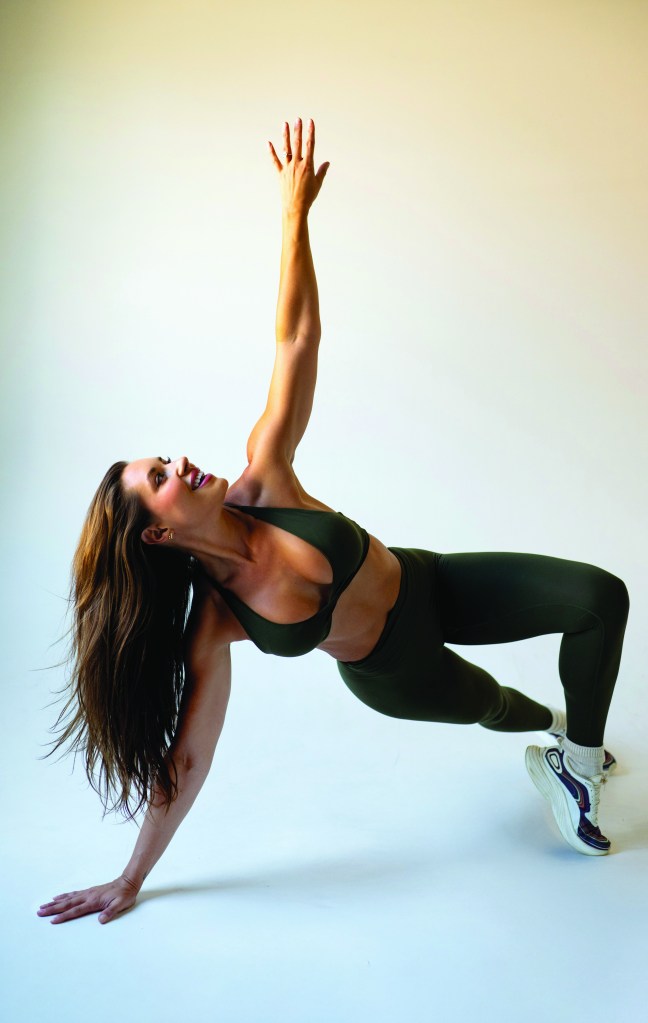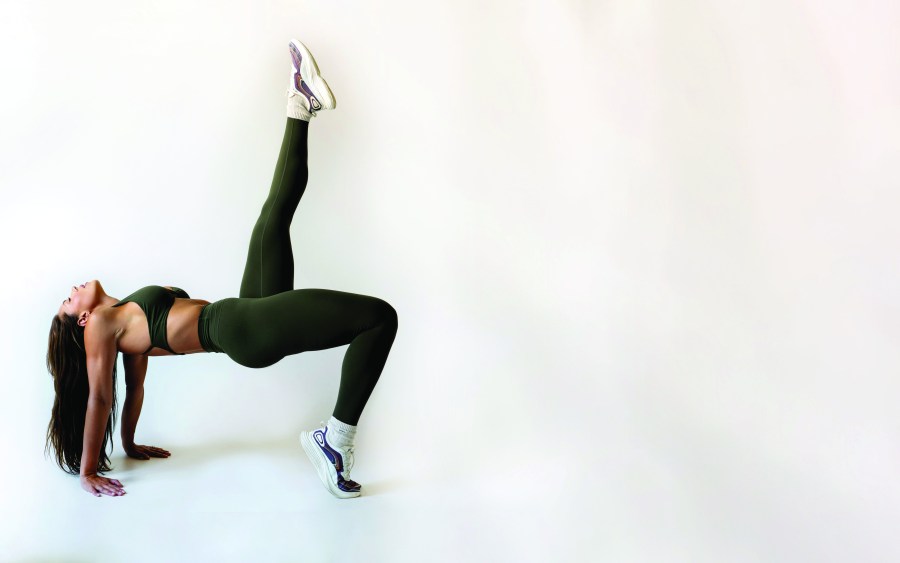Fitness extraordinaire Kelsey Wells talks to Joanna Ebsworth about the harmful effects of diet culture on social media, the importance of exercising for our emotional wellbeing and how she’s living her best life in her post-Sweat era…
Words: Joanna Ebsworth | Images: Lauren Kendall
If there’s one woman who knows all about the transformative power of home workouts, it’s Kelsey Wells. Now a world-renowned mental-health focused fitness trainer with an online community of over five million across the world, the 35-year-old mum-of-one from Utah began her own fitness journey back in 2014 – a few months after the birth of her son, Anderson – when her doctor suggested she take up exercise to help alleviate crippling postpartum anxiety and debilitating body image issues.
As a self-confessed ‘stranger to regular exercise’ who had, up until that point, only ever viewed fitness as a tool to shrink her body, Kelsey was soon Googling ‘home workouts’ and attempting to train in the hallway of her one-bedroom basement apartment whenever Anderson fell asleep. Initially, she admits to struggling with what she perceived then as the most basic of exercises, as well as feelings of frustration from her lack of physical progress. However, those early strength-training sessions made an almost-instant improvement to her quality of sleep, energy levels and state of mind, and Kelsey quickly fell in love with fitness during her first year of training – not for the way it made her look in the mirror, but for how it helped her to heal and feel better in herself.
Fitness qualifications soon followed, including pre- and post-natal certifications in a bid to plug the knowledge gap surrounding the lack of information available for new mums wanting to exercise, and this quickly led to Kelsey creating her first home fitness programme, PWR-Post Pregnancy, for fellow fitness professional Kayla Itsines’ online training platform, Sweat.
As a founding member on the Sweat app, Kelsey went on to devise a total of 15 strength-based PWR training programmes in less than nine years, and she also founded her Redefine Fitness: Strength and Mindfulness training method – which encourages women to prioritise their mental health, celebrate their bodies, and use movement as an act of caring for both physical and mental health – after a skiing injury in January 2022 left her out of action for several months longer than she anticipated.
So, when the global fitness superstar announced a few months ago on Instagram that she was quitting the Sweat app, which remains the home of all her training programmes today, it’s fair to say she sent shock waves through the internet. But if there’s one thing this women-empowerment advocate knows only too well, it’s that ‘lifequakes’, as she calls them, can provide a catalyst for change as well as an opportunity for growth and rebirth.

All change
When Women’s Fitness last caught up with Kelsey in 2023, the motivational speaker explained that she was restricting herself to low-impact workouts to aid her recovery. Almost two-years later, however, and Kelsey tells me over an emotionally charged Zoom call (which has us both tearing up at points) that while her workouts continue to be almost exclusively low-impact, she feels, ‘very grateful, on both a personal and professional level, for the very informative and important lesson’ that her injury has taught her.
‘I wouldn’t wish something like it on anyone,’ she says earnestly. ‘However, going through a severe injury, the reconstructive surgery and the healing process, and relearning how to walk, has given me such a depth of true empathy as a trainer for anyone who is facing injury or taking time off from exercise. I feel I’ve become a better trainer in that way, and it’s given me a level of understanding on how it feels to begin, and begin, again.
‘The reality is we all will face unforeseen lifequakes – whether that’s an injury, losing a loved one, going through a break-up or some other big change in life – that force you to recalibrate and begin your fitness journey again on some level,’ she continues. ‘When hypertrophy training and strength training, and all the habits that I’d been using for years to take care of myself mentally and physically, were suddenly off the table, I had to ask myself, “Now what?”.
‘And so I learned to view resting and meditation and some other non-physical tools as the forerunners to caring for my health, because they are just as valid as exercise depending on your situation. In a different way, I think a lot of women today are doing whatever form of strength training is really trending and being pushed on them, rather than figuring out the best modality that is going to work for them. And that’s why I encourage all women to really tap into themselves and where they’re at in life – physically and mentally and otherwise – and to train for their long-term goals, rather than doing something because it’s the next cool thing.’
Read our 2023 interview with Kelsey here
Mind over matter
Famous for sharing the ups and downs of her life in a brutally honest and touchingly authentic way, Kelsey believes now more than ever that fitness should be mental health-centred, which she says ‘means that we can no longer afford for exercise to be a detriment to our mental and emotional – and even our spiritual – wellbeing.
‘We see so many toxic and harmful rhetorics being thrown at us through diet culture and, unfortunately, many of the acceptable, even promoted habits and messages surrounding exercise and eating are not good for our mental health,’ she explains. ‘Therefore, we have to be almost vigilant in this day and age to make sure that the ways we’re moving and fuelling our bodies are also taking care of our mental and emotional wellbeing. That’s why I feel such a strong responsibility as a professional in the fitness industry to call out click-bait articles and social media posts that promote extreme diets, over-exercising and aesthetics-driven fitness, because training to look a certain way can actually harm your health.
‘Those posts and articles that share blanket statements claiming, “This is the one right way to exercise” and “This is the best way to eat” are untrue and can be harmful, especially when they are designed to incite fear or create insecurities that can be monetised,’ she continues. ‘But ultimately, your health is individual and it’s going to shift during different phases of your life. Even more so, while an intense way of training might feel wonderful for one person, it could be triggering for another, especially if that person has struggled with disordered eating, body dysmorphic thoughts or other kinds of mental health issues in the past. That’s why I will never stop raising awareness of those unhealthy narratives, and the more women I can help to think critically and see what’s real, the better,’ she says.
One way Kelsey has tried to raise awareness of click bait-style social media posts featuring negative messaging around fitness is to make her own attention-grabbing versions on Instagram – with a sarcastic twist. ‘I created a post with a hook that said something along the lines of, “Here’s the one tool that will change your workouts forever and give you maximum results”,’ she reveals with a knowing smile. ‘And the “tool” was to take a moment of mindfulness to set an intention for your session. And I truly believe in that, no matter how you’re training or at whatever time in your life. There are some things that are helpful for every single human wanting to be healthier, but these are not the things you’re being told.’

Getting personal
Given that we’re discussing the subject of aesthetics in fitness and how they can often be a driving factor in motivating people to train, I feel compelled to ask Kelsey (as sensitively as possible) whether she ever gets messages from people on social media saying things like, ‘Well, it’s okay for your to talk about the importance of mental health in fitness when you have a body like that.’ Because while I don’t have a single doubt that she believes 100 per cent in the power of exercise to promote feelings of self-worth and better emotional and mental health due to her own lived experiences, I can imagine she has to constantly battle cynics who say she’s built a successful brand on the way she looks.
‘I actually appreciate the question,’ answers Kelsey. ‘And I do get people saying that. They’ve said it my whole career. To be honest, I didn’t really know how to respond to those comments for a long time, so I had to take a really good look at myself and ask, “Well, is it easier for me?”. But I can say with my full chest that it isn’t. It’s down to how hard I have fought to do the mental and emotional work to rewrite those things for myself,’ she says with tears in her eyes. ‘Because the truth is, if you could snap your fingers and have whatever body you think would be ideal and perfect for you right now, your mindset and your love for your body would be zero per cent different.
‘I know women and people who exist in bodies of all shapes and sizes who are confident in their skin and at a healthy place in their mind and their body,’ she continues. ‘And I know so many women who look exactly like the conventional standard of beauty who are prisoners of their minds, and just walk through this world drinking the poison of comparison constantly and feeling full of never enough-ness. It is truly a mental situation. And the thing about issues such as disordered eating, body dysmorphic thoughts, food noise and the insecurities from things like cellulite and stretch marks, is you cannot tell by looking at someone to what extent they struggle.’
A healthy place
Kelsey admits at this point that, while she doesn’t have much cellulite now compared to a lot of women, she definitely has it and has done since the age of 13. ‘My cheer squad made fun of me because of it, so it’s something I’ve always hated about myself, and I wasted so much money on creams and spent so many years hiding my body because of the insecurity. Which is to say, if I speak about the impact of that now, I get a lot of online backlash as though I don’t have the right to talk about it. But the reality is, it’s not about how real something is for someone in their physical body; it’s about how much mental space it takes up in their mind.
‘I’m the first to admit I’ve had old insecurities come back in new ways, especially being in this industry and with my own personal experiences of disordered eating,’ she elaborates. ‘I’ve had to work hard to continue to remain in a healthy place and have a level of self-awareness that is very uncomfortable to get to. And so I say this, and I continue to say this, because every woman deserves so much to understand that their body is a miracle, and none of us should go through life with hate for our bodies.
‘I believe in loving your physical body, because that’s a place that you can live in,’ she adds. ‘So, it’s about saying “f’ you” to the stereotypes, and existing in your body from a place of peace, because it’s your vehicle to move through this life. That’s so much deeper than all of the headlines in my industry, and that’s the only reason why I’m still doing this stuff. Because I’ve had moments where it’s hard, especially when the hate online gets really real. But ultimately, it doesn’t matter because the things that make me feel emotional are the things that I know matter the most. And so I’m going to be out here doing my best to help as many women as possible come back to that love for themselves. There’s always going to be people who misinterpret me and dismiss me, and it’s just none of my business.’

Future goals
What is Kelsey’s business is trying to live her best life in her post-Sweat era, which has involved taking a lengthy hiatus from social media and not rushing into any new projects. ‘Sweat was a big part of my career, but that chapter closed on June 1, which is only a couple of months ago. And first of all, I want to say I’m so grateful that I’ve had the opportunity to take a break,’ she says. ‘I know in so many careers that’s just not a possibility, so it is not lost on me how lucky I am to be able to step away from social media for my mental health and just spend time focusing on being a more present wife and mother.
‘Although I’ve still been working, being able to shift and shape my work in a much slower way these past few months has been such a gift,’ continues Kelsey. ‘I can’t stress enough the importance of resting and slowing down. And while I know the reality for many people is that maybe they can’t change the hours that they work, I think we can all give ourselves the permission to not feel like we always have to be performing at our maximum level of productivity in every area of our lives.
‘I think women put a lot of pressure on themselves. We wear a lot of hats and always have a lot of balls in the air, and I think even in the course of one day, we tend to think back on all the things on our to-do list that we didn’t get done. Whereas I think we should be shifting that, and implementing a reflection each night to say, “I did that today. And I am grateful and proud of myself for all the efforts I put in today”,’ she affirms. ‘We need to focus on the things we did do and give ourselves permission to rest in that, do less and be more present. It’s about having a perpetual permission slip for yourself to go at a slower pace and not to pile on top of everything piling onto you, because there’s a real beauty in doing a little bit less and slowing down’.
It’s at this point that Kelsey, a big Lord of the Rings fan, quotes a line from J.R.R. Tolkien’s The Fellowship of the Ring, where Gandalf says to Frodo, ‘All we have to decide is what to do with the time that is given us,’ before adding, ‘Obviously, I understand the value of hard work, but I think the burnout and the hustle culture and the celebration of busyness is very unhealthy. And while I know this sounds corny, we only get this one life, and we don’t know how much time we do have. That’s why I think you’ll never ever regret sitting down to watch a sunset or stopping to share a kind word with the person at the coffee shop. You’ll never regret not doing that extra thing and having a conversation with your partner or your child or your mum instead by making that phone call – or taking that phone call that you’re too busy for. So, I guess this whole period has been a reminder to me of what matters most.’
A new chapter
Kelsey confides that she is feeling a lot of clarity in the wake of her ‘big career shift’, and later reveals she is currently working on a passion project that has been ‘living in her heart’ since she was a little girl, rather than rushing to put out new home-workout content. ‘I’m actually working on my first book. And while I can’t say much more on it now, I can say I don’t think it’s going to be what people expect from me. I’m not sure how it’s going to land, as I think some people might think it’s a little bit out of left field, considering that I’m a fitness trainer.
‘But I feel like it’s the most important thing I’ve ever done or tried to do with the platforms that I have, and I’m so grateful and excited to be that voice and to help women give themselves the permission that they really, really need to look after every part of their wellbeing – because we have enough trainers telling you to get off your ass and go do something,’ says Kelsey. ‘I will always speak to the importance of movement and exercise, but what I’ve tried to do my entire career is take a step back and look at all facets of your health, not just the physical. And I feel like I would be so remiss if I didn’t try to speak more about this kind of stuff, because we don’t hear about it very much.’
While Kelsey admits that putting out new workouts isn’t high on her list of priorities right now, she is adamant they’ll never be placed on the back burner permanently. ‘The one thing I’ve definitely learnt in my time since announcing my Sweat exit is that I am more passionate than ever about all
of the things we’ve talked about. And a big part of that is continuing to provide workout programming and strength-based programming for all phases of a woman’s life. That’s always been my mission, and I will absolutely continue to be a trainer. I honestly don’t know what capacity that’s going to look like yet – where my workouts would be hosted or if I’ll do my own thing – but I know that I’m not done and that devising workouts has not become any less important to me.’
When Kelsey adds that her personal health goals have also evolved over the past five years after sustaining her injury and losing both her grandparents, I’m not surprised one bit. ‘How we take care of our health today informs our future health, so my goals are no longer, “I’ve got to land this 48” box jump” or “I’m going to push myself harder than ever”. Woah, woah, woah, no!,’ she says emphatically. ‘Instead, I want to be able to be self-sufficient and strong and able to play with my grandchildren one day.
‘I want to be able to stand up if I fall down. So I now train with my overall health and longevity in mind, and what my quality of life is going to be like when I’m 60, 70, 80 and, hopefully, 90-years-old. Of course, things happen in life that are out of our control, but if we put effort into caring for ourselves, our minds and our bodies today, we will reap the benefits tomorrow.’







